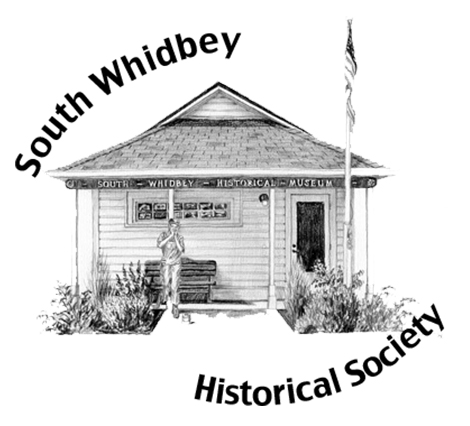
Johan (John) Frederick Hunziker, Sr.
Never in his wildest dreams did John Frederick Hunziker anticipate that he would end his days on a lovely island in an inlet of the Pacifi8c Ocean in the northwest comer of the United States. Born in Switzerland, he served as a missionary in Patagonia from 1860 to 1864.
He then went to the Falkland Islands, where he met his first wife, Martha, with whom he had five children. After Martha died, he married her sister, Madeline, and had an additional three children.
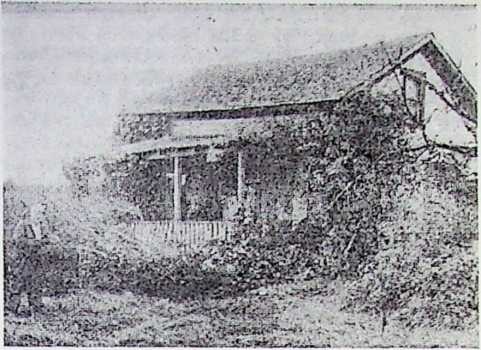
Langley Landmark—Noah Bucklew, Puget Sound Power & Light Co. employee, takes down the wires preparatory to the demise of one of Langley’s land¬marks, the old Hunziker place. (Dortha Palmerston photo)
In 1886 John determined that opportunities for his growing family would be better in the United States so they moved to Cottonwood, Minnesota where he and Madeline had three additional children: Stanley, Norah and Oscar.
Minnesota, with its severe winters, did not appeal to John as the place for a permanent home so he packed up his family and headed west, ending up in Everett where glowing accounts of the new village of Langley across the water were being circulated by Jacob Anthes.
John investigated and the tiny village in its beautiful setting with the sea at its feet, the snow-capped mountains in the distance and the forests at its back won his heart. He had found his home.
In 1898 John settled his family in the former CoJean house on five acres which he had bought from Anthes fronting what is now Sixth Street.
For over 60 years the house was known as “The Hunziker Place”. In 1960 it was removed to make way for a modern residence.
Walter Hunziker was 12 years old when his family moved to Langley. He was destined to become one of the town’s leading citizens.
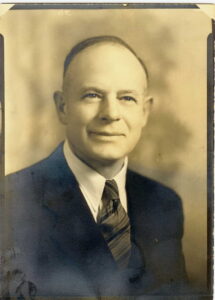 In his own words…
In his own words…
“I was born at Port Stanly in the Falkland Islands September 8, 1886. When I was two months old my father, mother and eight children came to the United States on a sailing ship which took three months from the Falkland Islands to New York via Portugal, Spain, France, Germany, and England.
We settled in 1887, near Cottonwood, Minnesota. This was near a small lake where the Sioux Indians used to stop and camp near our home once or twice a year on their journey to and from Pipestone Minnesota. There they got pipestone to carve pipes and other items to sell to the whites. My memory of them was of a very friendly people. My father was much interested in talking to them and trying to find any similarity in their language and the Patagonians.
I recall visiting in their teepee with my father and watching the Indian woman cooking something in a pot over an open fire and hoping father would leave soon, as one had heard that they ate dogs and skunks. They often stayed a week or more, and my brothers and sisters and I played with their children. When they would leave camp my brother often picked up pieces of pipestone of which I still have a piece. My father had them shell corn and gave them a meal for their work. The women would always gather up what food was left and take it to their papooses.
Father had intended to raise sheep. He bought three hundred sheep but the first winter the deep snow caved in the straw-roof shed and killed all the sheep.
When I was twelve years old I came to Washington State with my parents and three sisters and two brothers on an Immigrant Great Northern Train.
We arrived in Everett on March 24, 1899, and moved to Langley two weeks later on the stemwheeler steamboat Fairhaven.
We left Everett at 2 p.m. on a Tuesday and arrived at Langley 2 p.m. the next day. The steamer did not stop at Langley going north but stopped at all the logging camps on Camano Island and arrived at LaConner that evening where she tied up until the next morning. It was a wonderful experience for us children who had never been on a steamer. We had staterooms and meals were served aboard.
Father had bought five acres of uncleared land and a small house in Langley. He had an acre cleared for a hundred dollars, and he, my brother and I cleared the rest by hand.
Our first visitor was an old Indian woman with a large salmon. A ten or twelve pound salmon sold for 25c (two bits). She told father the price was two bits. Father, not knowing what two bits was, offered her two nickels. She refused. Father then put two dimes in her hand, and she again said no, two bits, but took the money. She left but returned the next week with her husband leading her by about twenty steps. As soon as he was within hearing distance he yelled, “Two bits – a quarter – 25 cents.’’ That was how we first knew what two bits was.
My first job was picking prunes for Jacob Anthes who owned most of Langley and had a large prune orchard and a prune drying plant. We were told to bring any cracked or bruised prunes. He would dump them into a barrel and make prune “Jack” which he sold to the Indians. He was the Postmaster and had the only grocery store in Langley.
I was hired by Mr. Anthes to meet the steamer Fairhaven each night to deliver and receive the mail at the Langley dock which was located in 1900 at the foot of Anthes Avenue. The steamer would arrive anywhere from midnight to two or three a.m., so I slept in the warehouse at the end of the dock. My pay was S10 a month.
“In the summer of 1906 Arnold Bosshard and I worked in Everett. Our sweethearts lived in Langley, (Alice Howard and my sister, Alice). The only way we could get home on Saturday nights was to hire a rowboat for $2 for the week-end. We had two sets of oars and a small sail. We left Everett at 7 p.m. Saturday night and with good luck we would arrive at Langley at 10 p.m. Our sweethearts would always be at the dock waiting for us. We generally sailed back Sunday p.m. with a fair north wind.
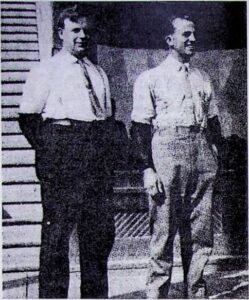
Walter Hunziker (left) stands next to his brother Bob in front of the Langley Mercantile and General Merchandise Store. The picture was taken in 1913.
One dark night the tide carried us on the south side of Hat Island instead of the north side which was closer. We would watch for the light at Sandy Point to guide us and by looking over our shoulders occasionally we would eventually get home. This night there was no moon and we saw what we thought was the Sandy Point light and kept rowing until the moon came up and what we thought was the Sandy Point light was a lantern on the end of a boom of logs on its way to Seattle. We discovered we were opposite Clinton. We got to Langley at 2 a.m. Our sweethearts were waiting for us. We were married that fall.
Salmon were so plentiful that I recall killing salmon with our oars as we rowed through schools of them on their way to the Snohomish River. I also recall a fish trap at Maple Cove that once had so many salmon they could not raise the net. They notified the town that we could have all we wanted for 5 cents each. I got a horse and wagon and sold a load of them at 10 cents each.”
Walter Hunziker, Sr.
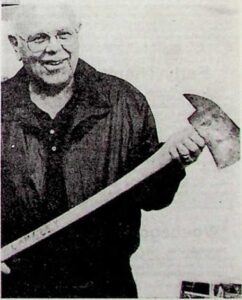
Walt Hunziker was presented a fire ax at a surprise party honoring his 52 years of volunteer service for the Langley Fire Department. Hunziker has retired but not before the city honored him at the fire halL
Walt Hunziker, Jr.
After 52 years of responding to alarms, Walt Hunziker, Jr. retired from the Langley Volunteer Fire Department. The firemen and the city gave their thanks and appreciation during a surprise party for Hunziker on Oct. 27.
Hunziker had been told the party was to celebrate the passing of the bond issue for a new fire truck. He was amazed and a little tearful when he discovered the celebration was really for him.
Hunziker joined the volunteer fire department in 1932. Since he was only 16 he needed a letter from his parents giving permission. He said there was not much of a department at that time. The fire equipment consisted of an old Model T Ford with a 50 gallon chemical tank in the back. “The truck often needed to be towed because it wouldn’t start,” Hunziker said.
Later a hose truck was purchased, but the firemen had to depend on hydrants since the truck wouldn’t carry water.“We covered all fires on South Whidbey at that time and had to learn to cope with a minimum supply of water,” Hunziker said.
He said they lost a lot of buildings at that time because of the long distances they had to go. They covered an area from Bush Point Road to Glendale because there were no other fire trucks on South Whidbey.
In 1950 an official fire district was started and the city purchased a pressure fog tank, which he carried on his pick-up for years until the district got a truck.
Hunziker often purchased his own equipment such as extinguishers, hoses, and outfits. He also used his own truck to reach fires because he could respond quicker than the fire truck.
Once on a frosty night there was ice on the road when Hunziker left to answer a fire call. When he turned to go down Coles Road his truck slid on the ice and he ended up in a ditch with the truck rolled over. When the fire truck came along he jumped on the truck and went on to the fire.
His wife Emmy had no knowledge of what happened until Dr. Thomas Corlew called to see how he was.
“My heart just stopped, when the doctor said he should have been home an hour ago,” Mrs. Hunziker said. She told the doctor he must have gone on to the fire.
Dr. Corlew replied that Walt was doing his civic duty, so he would do his and come over when he got home.
Hunziker told of the fire at the old Whidbey Record office on Front Street. The firemen were watering down the football field at the high school when the alarm sounded.
Dave McLeod, not knowing the truck was gone, ran back to get the equipment, threw open the door and found Mr. Tiemeyer’s cow standing there in the fire hall.
The hose and truck were finally on the site and the 90 pounds of water pressure coming through a two inch hose “really cleaned out the place,” Hunziker laughed. “The paper moved to Oak Harbor and didn’t return to Langley until we got better equipment.”
Hunziker served as fire chief for several years. He has also served the community on the city council, as president of the Community Club, Commander of the VFW, and Lions Club president.
Hunziker worked as the Standard Oil distributor in Langley for 38 years. He has always felt that “when you get something out of a city you should bring something back.” This was the reason he gave for his long dedication as a volunteer.
Ernie Walters, current Langley Fire Chief, told how Hunziker volunteered his own equipment and absorbed all the cost. “He often extinguished fires before the fire truck could reach it,” Walters said.
“That’s just the kind of dedicated volunteer he was. We will miss him,” Walters said. “He stayed with us a long time.”
Hunziker was presented a Langley fire ax Sunday night, as well as a cassette player. The Langley City Council unanimously passed a proclamation Oct. 27 expressing thanks and appreciation for his long service with the city. Council members Dick Johnson and Dorothy Cleveland were on hand to present the gifts and letter.
Emmy Hunziker was presented a necklace for her long service of cleaning smoky clothes and for “all her great back rubs,” Walt added. The surprise occasion was organized by the Women’s Auxiliary headed by Vicki Lash.
